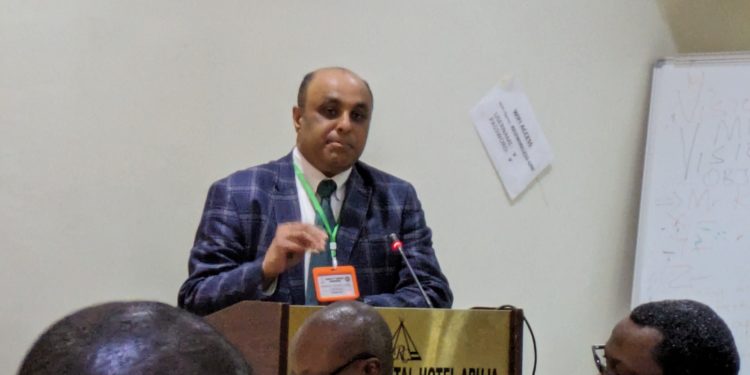By Kemo Cham in Abuja
The world has no option but to work towards attaining Universal Health Coverage (UHC), Dr Dennis Cherian, Acting Managing Director of Technical Services at Corus International, has said.
He told Journalists at a Media Science Café in Abuja, Nigeria during a pre-conference session at the 11th Biannual Conference of the African Christian Health Association Platform (ACHAP) that despite challenges to attain the global health target, progress has been realized and that this progress needs to be built upon to move forward.
The ACHAP biannual conference is taking place at the Riez Continental Hotel in the Federal Capital of Nigeria, bringing together delegates from all ACHAP member countries across the continent, as well as partner organizations from across the world.
The Media Science Café is one of six pre-conference sessions that took place on Tuesday. They included discussions on closing the gap on HIV epidemic control and primary health care as foundation stone for UHC.
Dr Cherian, who is also Associate Vice President for Health, Nutrition and WASH at Corus International, one of the partner organizations of ACHAP, was giving a talk on the importance of achieving universal health coverage, the challenges and opportunities, among others. His presentation specifically focused on how Africa is faring.
“Health for all is a human right and that’s a right for all of us to achieve,” said Cherian, a global health and development expert.
“To achieve that, we live in contexts and countries that are affected by conflicts, good governance issues and a lot of natural calamities as well. But despite that, I don’t think we have an option but to achieve it,” he added.
The conference is being held on the theme: ‘The Journey to achieving Universal Health coverage in Africa; Experiences and Lessons from faith communities.’
UHC, according to the World Health organization (WHO) means that all people have access to the full range of quality health services they need, when and where they need them, without financial hardship.
WHO’s definition of the concept covers the full continuum of essential health services, from health promotion to prevention, treatment, rehabilitation, and palliative care across the life course.
The global health agency’s latest report on progress on achieving UHC, released in September 2023, reveals that the world was off track to making significant progress towards meeting its target by 2030, as envisioned in the Sustainable Development Goals (SDGs) of the United Nations. It notes that improvements to health services coverage had stagnated since 2015, and that the proportion of the population that faced catastrophic levels of out-of-pocket health spending increased continuously since 2000.
This global pattern, according to the report, was consistent across all regions and the majority of countries.
Signs of lack of progress on UHC are especially prominent in Africa, which suffered serious disruptions in essential services due to the Covid-19 pandemic.
WHO recommends that to build back better, countries need to reorient their health systems using the primary health care (PHC) approach, which it says can be conduit to deliver 90 percent of essential UHC interventions, potentially saving 60 million lives and increase average global life expectancy by 3.7 years by 2030.
Dr Cherian is optimistic about achieving this, although, in his estimation, not within the projected time frame. He also said that it’s contingent on countries lagging behind learning from what has been achieved in those that have realized some progress, citing his home state of Kerala in India, Ethiopia, Ghana and Vietnam as examples of countries where investment in PHC has increased life expectancy by multiple folds.
“It is true that we live in a context where conflicts, lack of peace and all of those are hampering our efforts to achieve universal healthcare and [it could be of course a big barrier], but certainly strides are being made,” Dr Cherian said, adding: “It could take time, I am not sure we could be able to achieve it within the projected time of 2030, but I think we need to learn from what has been achieved … to improve on governance and take lessons learnt from other countries if we can apply them to our own contexts.”
About 20 journalists from within Abuja attended the Media Science Café which was facilitated by Internews, a partner of ACHAP, with funding support from IMA World Health and Corus.
The panel also included a religious leader and a journalist.
Internews journalism trainer Chaacha Mwita from Kenya moderated the over three-hour long session.
Faith-based organizations (FBOs) deliver a significant proportion of essential health services through primary healthcare, which is described as the backbone of UHC, particularly in Sub Saharan Africa.
ACHAP says a strategic partnership between these organizations, health professionals and journalists can focus public attention on UHC and push decision makers in government and civil society to invest adequately to meet the target of UHC by 2030.
ACHAP’s Project Coordinator, Ruth Gemi, said the session marked a “crucial journey towards achieving Universal Health Coverage,” urging the participants to take advantage of the discussion and harness the power of journalism in a positive way.
Dr Jayalakshmi Shreedhar, Health Advisor at Internews, said the Café was designed to serve as source of information on possible ideas for stories that could contribute in tracking progress towards UHC as well as shine light on why some countries are making more progress than others.
“We are seeing too much superficial reporting that is just negative [and] not really informing policy makers [or the people] about their rights…,” she said, adding: “So we need more in-depth investigative stories from journalists about Universal Health Coverage.”






















